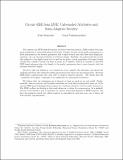| dc.contributor.author | Brakerski, Zvika | |
| dc.contributor.author | Vaikuntanathan, Vinod | |
| dc.date.accessioned | 2017-08-30T17:44:50Z | |
| dc.date.available | 2017-08-30T17:44:50Z | |
| dc.date.issued | 2016-07 | |
| dc.identifier.isbn | 978-3-662-53014-6 | |
| dc.identifier.isbn | 978-3-662-53015-3 | |
| dc.identifier.issn | 0302-9743 | |
| dc.identifier.issn | 1611-3349 | |
| dc.identifier.uri | http://hdl.handle.net/1721.1/111070 | |
| dc.description.abstract | We construct an LWE-based key-policy attribute-based encryption (ABE) scheme that supports attributes of unbounded polynomial length. Namely, the size of the public parameters is a fixed polynomial in the security parameter and a depth bound, and with these fixed length parameters, one can encrypt attributes of arbitrary length. Similarly, any polynomial size circuit that adheres to the depth bound can be used as the policy circuit regardless of its input length (recall that a depth d circuit can have as many as 2d
inputs). This is in contrast to previous LWE-based schemes where the length of the public parameters has to grow linearly with the maximal attribute length.
We prove that our scheme is semi-adaptively secure, namely, the adversary can choose the challenge attribute after seeing the public parameters (but before any decryption keys). Previous LWE-based constructions were only able to achieve selective security. (We stress that the “complexity leveraging” technique is not applicable for unbounded attributes).
We believe that our techniques are of interest at least as much as our end result. Fundamentally, selective security and bounded attributes are both shortcomings that arise out of the current LWE proof techniques that program the challenge attributes into the public parameters. The LWE toolbox we develop in this work allows us to delay this programming. In a nutshell, the new tools include a way to generate an a-priori unbounded sequence of LWE matrices, and have fine-grained control over which trapdoor is embedded in each and every one of them, all with succinct representation. | en_US |
| dc.description.sponsorship | National Science Foundation (U.S.) (Award CNS-1350619) | en_US |
| dc.description.sponsorship | National Science Foundation (U.S.) (Grant CNS-1413964) | en_US |
| dc.description.sponsorship | United States-Israel Binational Science Foundation (Grant 712307) | en_US |
| dc.language.iso | en_US | |
| dc.publisher | Springer | en_US |
| dc.relation.isversionof | http://dx.doi.org/10.1007/978-3-662-53015-3_13 | en_US |
| dc.rights | Creative Commons Attribution-Noncommercial-Share Alike | en_US |
| dc.rights.uri | http://creativecommons.org/licenses/by-nc-sa/4.0/ | en_US |
| dc.source | MIT Web Domain | en_US |
| dc.title | Circuit-ABE from LWE: Unbounded Attributes and Semi-adaptive Security | en_US |
| dc.type | Article | en_US |
| dc.identifier.citation | Brakerski, Zvika, and Vaikuntanathan, Vinod. “Circuit-ABE from LWE: Unbounded Attributes and Semi-Adaptive Security.” Robshaw M. and Katz J., editors. Advances in Cryptology – CRYPTO 2016. Lecture Notes in Computer Science 9816 (2016): 363–384 © 2016 International Association for Cryptologic Research | en_US |
| dc.contributor.department | Massachusetts Institute of Technology. Computer Science and Artificial Intelligence Laboratory | en_US |
| dc.contributor.department | Massachusetts Institute of Technology. Department of Electrical Engineering and Computer Science | en_US |
| dc.contributor.mitauthor | Vaikuntanathan, Vinod | |
| dc.relation.journal | Advances in Cryptology – CRYPTO 2016 | en_US |
| dc.eprint.version | Author's final manuscript | en_US |
| dc.type.uri | http://purl.org/eprint/type/ConferencePaper | en_US |
| eprint.status | http://purl.org/eprint/status/NonPeerReviewed | en_US |
| dspace.orderedauthors | Brakerski, Zvika; Vaikuntanathan, Vinod | en_US |
| dspace.embargo.terms | N | en_US |
| dc.identifier.orcid | https://orcid.org/0000-0002-2666-0045 | |
| mit.license | OPEN_ACCESS_POLICY | en_US |
| mit.metadata.status | Complete | |
